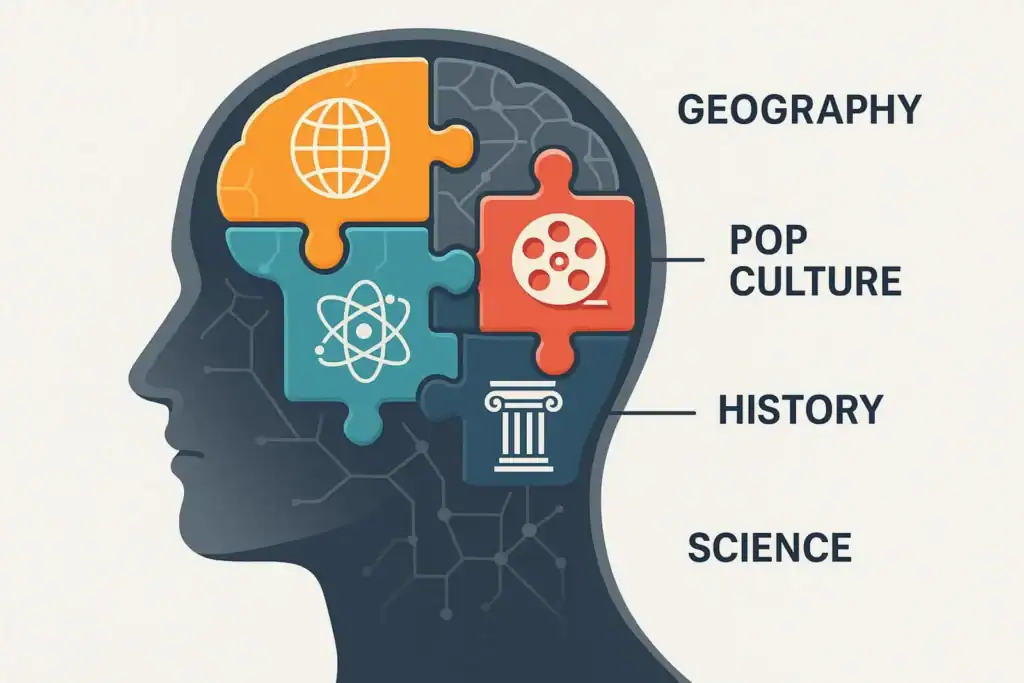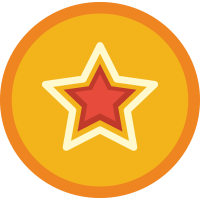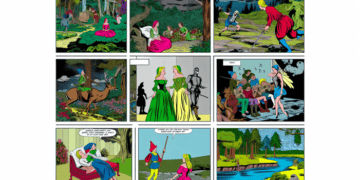Studying for trivia is more than memorizing lists. You build a wide base of knowledge, sharpen how you think, and practice pulling facts from memory fast. The goal is to turn a sea of facts into a clear, fun path. Whether you want to win at pub quiz, wow your friends, or aim for shows like Jeopardy!, a smart plan can boost your results and make learning enjoyable. This guide covers key parts of trivia prep, from question styles to memory tools and how to guess with confidence.
Becoming great at trivia isn’t about raw IQ; it’s about learning how to play. As sites like QuizRunners note, success comes from active learning, smart strategy, and steady practice. Break training into clear skills and repeatable methods, and you can raise your game while enjoying steady growth.
What Does Effective Trivia Studying Involve?
Good trivia study is active and varied. It’s more than cramming. You learn how questions are phrased, build a solid, connected web of facts, and practice getting answers out quickly under pressure.
Trivia covers nearly every topic. Strong players mix knowledge with clue-hunting. You’re not just a walking fact book; you’re also a problem-solver who spots hints, makes links, and finds answers even with limited info.
What Skills Are Needed for Trivia Success?
Many skills matter in trivia. Key ones include:
- A broad, growing knowledge base across history, science, arts, pop culture, geography, and current events. Jeopardy! contestant Jack Izzo recommends taking in lots of media-movies, TV, music, and books.
- Critical thinking: break a question into key points and ignore extra fluff.
- Pattern spotting: notice common themes and “giveaway” clues.
- Educated guessing and risk management.
- Time control and calm under pressure.
- Teamwork skills for group play.
What are Common Trivia Question Types?
Expect a mix of styles:
- Simple recall: names, dates, places.
- Conceptual links: connect ideas or find relationships.
- Wordplay and hints: alliteration, puns, or theme clues that point to the answer.
Many quizzes use “Pavlovs” or “stock clues,” where a set phrase points to a common answer. Learning these patterns is a big help.
| Clue phrase | Likely answer |
|---|---|
| Russian duelist | Alexander Pushkin |
| Iowan painter | Grant Wood |
| Wegman’s dog with lots of W’s | Weimaraner |
Think of many questions as puzzles you can solve with logic and context, not just brute recall.

How to Identify Trivia Topics Worth Studying
Trying to learn everything at once can feel like drinking from a firehose. The smarter move is to focus on topics that appear often. This means learning how questions are built and what fits the common “trivia canon.”
Spotting high-return areas helps you focus your time. Instead of wandering, you spend study time where it pays off most.
How to Analyze Patterns in Trivia Questions
Every quiz source favors certain topics. Watch for repeats and trends. If your pub quiz loves U.S. Presidents, review those. If an app leans into celebrity news, add that to your plan.
Go deeper than broad categories. Within a topic, some people or events show up more often. You’ll see Kennedy more than Fillmore in presidential questions. Knowing these habits narrows what you need to study.
What Are the Most Frequent Categories in Trivia?
These categories show up almost everywhere:
- History: U.S. and world
- Geography: countries, capitals, landmarks
- Science: physics, chemistry, biology, astronomy basics
- Pop culture: movies, music, TV, celebrities
- Literature and arts
- Sports
As Jeff McLaughlin and Mark Hill note, some topics are “universal,” like capital cities, Best Picture winners, and major movie stars. Build a strong base here for the best return. Keep up with current events too-recent news often turns into questions, even years later.
How to Recognize Core Knowledge Areas-The Trivia ‘Canon’
The “trivia canon” is the set of facts most people are expected to know. Good questions are tough but fair, as Jack Izzo explains. If a clue points to a 1940s film, the answer is more likely Citizen Kane or It’s a Wonderful Life than an obscure B-movie.
Focus on the biggest names, works, and ideas in each field. These common answers help you guess well even when you’re unsure.
| Field | Common answers |
|---|---|
| Film (1940s) | Citizen Kane; It’s a Wonderful Life |
| Art | Picasso; Monet; Van Gogh |
| Psychology | Freud; Jung |
| U.S. Presidents | Washington; Lincoln; FDR; JFK |
What Methods Help Memorize Trivia Facts?
Memorization matters, but it doesn’t have to be boring. Modern techniques make facts stick and come back fast during games. The aim is to connect new info to what you already know.
With the right tools, memorizing goes from hard and dull to engaging and useful, so those tricky facts are ready when you need them.
How Mnemonics and Memory Techniques Improve Recall
Mnemonics help you remember by linking new info to something familiar, often with vivid images or humor. As memory teacher Anthony Metivier says, a mnemonic is anything that helps you remember.
- Acronyms and acrostics
- Rhymes and stories
- Memory Palace (place items in rooms along a route)
- Major System and PAO (Person-Action-Object) for numbers

These methods tap into strong visual and spatial memory. Make images personal and lively so they stick.
What Role Does Chunking Play in Memorization?
Chunking means grouping small bits into larger blocks. It lowers mental load and speeds recall. Instead of ten loose facts, you remember one linked set.
Turn details into a short story or map. For John Steinbeck, connect titles to simple tags:
| Hook | Work |
|---|---|
| “Okies” and Dust Bowl | The Grapes of Wrath |
| George and Lennie | Of Mice and Men |
| Cain and Abel theme | East of Eden |
How to Use Spaced Repetition for Long-Term Retention
Spaced repetition means reviewing at growing time gaps, right before you forget. Tools like Anki do this automatically, but flashcards or a notebook work too.
| Review round | Example gap |
|---|---|
| 1 | Same day |
| 2 | 2-3 days |
| 3 | 1 week |
| 4 | 2-3 weeks |
| 5 | 1-2 months |
Short, regular reviews move facts into long-term memory better than one long cram session.
How Practice and Exposure Enhance Trivia Skills
Knowledge is one side; using it fast is the other. Practice builds recall speed, strategy, and calm. Like sports, you get better by doing.
How Practicing with Flashcards and Quiz Apps Reinforces Learning
Flashcards push active recall. Writing them by hand, as Lynne Kelly suggests, helps lock info in. Review on a schedule and mix in spaced repetition. Quiz apps and online games add quick checks and keep score.
Many apps track weak spots and adjust what you see, so your practice hits the right areas. The fast pace also trains quick thinking and fixes mistakes right away.
Why Watching Game Shows and Playing Quiz Games Builds Experience
Shows like Jeopardy! and Who Wants to Be a Millionaire expose you to many topics and clue styles. Playing along gives you reps without feeling like homework.
You’ll learn common themes, timing, and the feel of “stock clues.” This mix of fun and practice helps patterns sink in and prepares you for real matches.
How to Simulate Real Trivia Conditions
Practice the way you play. Join a trivia night, a league, or set up games with friends. Use solid bar trivia software or timed drills. Memory expert Nelson Dellis says, “to win you need to practice competing.”
Try noisy spaces to build focus. Add time limits, quick recall, and team talk. Variations like these build steady nerves and better results on game day.
How to Approach and Answer Trivia Questions Effectively
Knowing facts is only step one. You also need to read clues well, use context, and choose when to guess. Language skills, logic, and knowing your own strengths all play a part.
These habits turn half-formed ideas into solid answers and can decide a match.
How to Decipher Question Wording and Spot Wordplay
Writers often hide hints in phrasing. Jack Izzo suggests breaking a clue into bullet points and watching signal words:
- “Who” = a person
- Dates = events or timelines
- Adjectives can point to specific names or works
Extra details can mislead. Cut the noise and focus on key bits. For example, if a clue says “Austrian psychiatrist,” it likely points to Freud, even if other info distracts you. Careful reading helps you rule things out and land on the right pick.
When to Make Educated Guesses
Guessing helps, especially where wrong answers carry no penalty. Even with penalties, a guess can be worth it if you’ve narrowed options. The key is to use context, remove unlikely choices, and lean on patterns you know.
Your first gut answer is often right. Don’t overthink unless you spot a clear reason to switch.
How to Manage Time and Stay Focused During Trivia
With timers, pace matters. Don’t freeze on one hard question. Take a breath, stay calm, and move on if needed. On teams, keep talk clear and short so everyone can add input.
Train yourself to switch gears fast. Practice under game-like pressure so your recall stays smooth.
What Resources and Tools Aid Trivia Study?
There are many helpful tools: books, audio, apps, and websites. Using the right mix makes study faster and more fun. Build a well-organized system so you keep what you learn.
Mix these into your routine and you’ll grow both depth and breadth over time.
How to Use Trivia Books, Podcasts, and Online Databases
- Books: curated facts, topic lists, and drills
- Audiobooks: learn while you commute or exercise
- Podcasts: expert chat and stories that stick
Online tools to try:
- Wikipedia: jump from page to page and explore
- Sporcle and JetPunk: interactive quizzes, great for geography and general facts
- J-Archive (j-archive.com): past Jeopardy! clues to study common formats and topics
How to Create a Progress Journal for Tracking Improvement
A study journal helps you see growth and fix weak spots. Memory athlete Johannes Mallow and Anthony Metivier both recommend writing as a memory booster.
- Summarize new facts and links you made
- List missed questions and what tripped you up
- Note patterns you notice in clues
- Record what study tactics worked
Writing strengthens recall and guides what to practice next.
How to Maintain Motivation and Prevent Burnout While Studying for Trivia
Long-term goals can wear you down. Keep learning fun, set balanced challenges, and build a support circle. Feed your curiosity so training stays enjoyable.
Healthy habits and social study keep energy high and growth steady.
How Accountability Partners and Study Groups Boost Commitment
Solo study can feel lonely. A partner or group can keep you on track. Anthony Metivier suggests practicing with friends who share your goals.
Teams trade knowledge, quiz each other, and talk through hard clues. Group chat often creates insights you wouldn’t reach alone-plus it’s more fun.
What Are Healthy Habits for Sustained Learning?
Good sleep, solid nutrition, and regular exercise help your brain learn and recall. Keep an eye on your “challenge-frustration curve” from The Victorious Mind: push yourself, but ease up if stress rises too high. Follow your curiosity-even if it takes you down a Wikipedia path-so study feels like play, not a chore.
Common Misconceptions About Studying for Trivia
Trivia has myths that can slow you down. Clearing them up helps you study in smarter ways.
Drop these false ideas and you’ll make better use of your time.
Is Trivia Only About Rote Memorization?
No. While repetition helps, trivia is more than drilling facts. As The Modern Rogue says, the fun is in learning interesting things, not becoming a robot.
Real success comes from linking ideas, spotting patterns, and thinking on your feet. Mnemonics, chunking, and spaced repetition make learning active and meaningful, not just repetitive.
Does General Knowledge Guarantee Trivia Success?
A wide knowledge base helps, but it doesn’t guarantee wins. Being “smart” and being “good at trivia” are different, as Jack Izzo notes. Time pressure and clue style can trip up even very bright people.
You need to read questions well, notice hints, guess wisely, and handle stress. Learn the trivia canon so your guesses land on common answers. Depth in one niche won’t carry you if questions move outside it; build breadth and apply it with strategy.
Final Tips for Building Trivia Mastery
Mastery is a journey. Facts, culture, and science keep changing, so keep learning. The best players stay curious and keep adding to what they know.
Use the tips below to keep that mindset strong and your study habit steady.
How to Keep Expanding Your Knowledge Base
The best long-term plan is simple: never stop learning. New facts and cultural moments appear all the time. Read the news a few minutes a day. Mix books, videos, apps, and games. Build up leaders, capitals, and maps over time.
Follow topics that grab your interest, even if they seem narrow. Odd facts often bridge to other answers later. The more you explore, the easier new info sticks and old info comes back fast.
How to Stay Curious and Make Learning Enjoyable
Keep it fun so you stick with it. Pick formats you like: documentaries, history podcasts, museum visits, or just paying attention to movie posters, album art, and headlines.
Let the simple win of learning something new drive you. As Anthony Metivier notes, memorizing trivia makes games with others more fun-and growing your knowledge helps you every day. Enjoy the hunt, and strong results will follow.








































